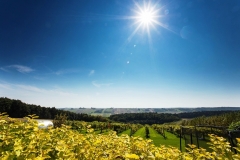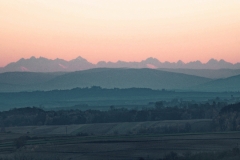The vineyard area is built of marl of upper chalk covered with quaternary lesser. The water is of very good quality (1st class cleanliness), allowing it to be used without treatment. Air cleanliness is one of the best in the country.
The above-mentioned advantages of the vineyard complements the authentic charm of the Dosłońce area, which includes in particular: sunsets and views of mountains (eg Tatra Mountains with good visibility). This charm made this place my life habitat.
At the beginning, a significant impediment, as research has shown, was the mineralized loess soil. The humus content was zero and the NPK content was four times lower than the nominal value of soil, pH = 5.5.
In 2018, the crop per ha was restored to an average level. To reach it many experiments and trials were be done.
Herbicides are an important threat to the vines. For a large part of the vine species, even smell drift is dangerous;
As it turns out, the air temperature during spraying is critical. If it approaches 25°C, the risk of transferring the herbicide aroma increases. Therefore, spraying in a field near the vineyard should be carried out during the daytime, when the temperature is the lowest, i.e. early in the morning. Unfortunately, it is difficult to find a level of agreement between agricultural producers and vineyards.
The only solution is to plant the most herbicide-resistant vine varieties. To know, I had to define these species through practice.



